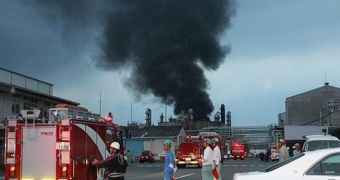A chemical blast at a large Japanese plant operated by Nippon Shokubai is set to create a serious dent in the global supply of diapers.
The company produces super-absorbent polymers, required for manufacturing diapers, and controls about a fifth of the market, the Telegraph reports. The 900,000 square meter plant used acrylic acid to manufacture said polymer.
Its yearly output of 320,000 tons of the aforementioned polymer made the Japanese factory the largest global producer and distributor of the superabsorbent polymer. The polymer works by bonding hydrogen and water molecules, allowing it to quickly absorb infants' waste.
This quality gives diaper companies that use the formula an edge over their competitors on the market. The resulting diapers can absorb 50 times their weight in liquid.
The blast at the production plant is sure to affect sales of diapers worldwide. Other facilities are set to pick up the extra workload, but are not fit for the large scale of the operation.
The company was planning to expand more on the Chinese market, and, with several contracts on the way, it was working overtime to cater to the large demand.
Saturday's explosion at the Himeji plant in Japan, in the proximity of the city of Osaka, let to the death of a firefighter and the hospitalization of other 30 emergency service operators for severe injuries. 10 factory workers and 2 police officers were also wounded.
Local authorities are still investigating as to the cause of the blast, but it is believed that it all started with an acrylic acid tank blowing up. After the initial, large blast, there was a smaller, second explosion, in which another acrylic acid tank went up in smoke.
A third tank, containing toluen, followed. The explosions all took place between 2:30 PM to about 3 PM, NHK World News informs.
Flames rose dozens of meters above the ground, destroying many of the plant's storage, development and office blocks. Locals were terrified, as the blast shook neighboring residential buildings to their core.

 14 DAY TRIAL //
14 DAY TRIAL // 